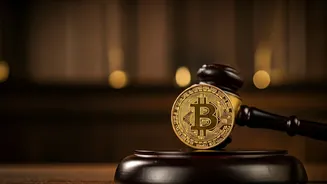Defining Legal Status
The Madras High Court's ruling is a landmark decision, formally acknowledging cryptocurrencies as legally protected property within India's judicial system.
This recognition is critical because it essentially grants crypto assets the same protections as other forms of property under the law. Until this ruling, the legal status of cryptocurrencies in India was ambiguous, leaving investors and traders in a state of uncertainty regarding their rights and the security of their digital holdings. The court's clarification sets a precedent for how these assets are viewed and handled. It allows for clearer guidelines on how to navigate the ownership, transaction, and protection of crypto holdings, enhancing investor confidence and providing a structured framework for future regulations. This step is a significant one towards integrating digital assets more firmly into the Indian financial ecosystem.
Implications for Investors
This legal protection significantly benefits cryptocurrency investors in India. Previously, without clear legal backing, crypto investments carried higher risks. This new ruling empowers investors by establishing that their digital assets are safeguarded under the law. It gives investors recourse through legal channels if their assets are misappropriated or involved in disputes. Moreover, this clarification fosters trust and encourages broader participation in the cryptocurrency market. With legal protection in place, investors can be more confident in storing, trading, and utilizing their crypto assets. The ruling is a critical factor for both individual investors and larger institutional players considering the Indian market. It offers a more secure and regulated environment which ultimately facilitates the sustainable growth and integration of cryptocurrency within the country's economy.
Impact on Regulations
The Madras High Court's decision is poised to influence the formulation of future cryptocurrency regulations in India. By legally recognizing crypto as property, the ruling influences how regulatory bodies approach the drafting of new laws and guidelines. This will bring greater certainty regarding taxation, trading, and the overall framework for digital assets. The ruling potentially paves the way for a more streamlined and transparent regulatory structure. Government bodies are likely to use this as a basis for creating comprehensive policies that balance the promotion of innovation with the need to protect investors. Further, it may encourage regulators to address critical areas, such as anti-money laundering and know-your-customer (KYC) requirements, thereby reducing the risk of illegal activities and promoting market integrity. This will facilitate greater clarity and consistency across the cryptocurrency landscape, benefiting both businesses and consumers.
Future Market Trends
The legal endorsement of cryptocurrencies as protected property by the Madras High Court could positively affect the Indian crypto market's trajectory. This judicial endorsement has the potential to draw increased interest from both local and international investors, due to the added assurance of legal backing. The ruling creates a more stable, favorable climate, which is crucial for fostering sustainable growth and attracting significant investment into the Indian crypto sector. Consequently, this shift could result in increased trading volumes, greater market liquidity, and the development of more crypto-related products and services. The decision may also influence traditional financial institutions to cautiously incorporate crypto-based offerings into their portfolios, thus broadening the scope of the market. Overall, this pivotal ruling from the Madras High Court is likely to spur market expansion, encouraging innovation, and strengthening India's position in the global cryptocurrency landscape.














